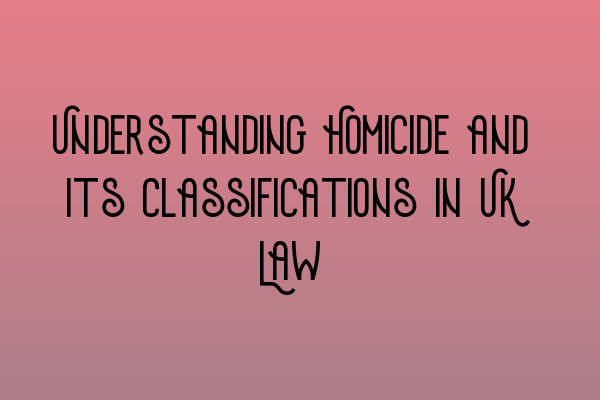Understanding Homicide and Its Classifications in UK Law
In the field of criminal law, homicide is one of the most serious offenses a person can be charged with. It involves the unlawful killing of another person, and the consequences for the offender can be severe. It is important to understand the different classifications of homicide in UK law to fully comprehend the potential legal implications.
1. Murder:
Murder is the most serious form of homicide. It is defined as the intentional and unlawful killing of another person with malice aforethought. Malice aforethought means that the offender had the intention to cause serious harm or death to the victim. Murder carries a mandatory life sentence in the UK, with a minimum term to be served before parole eligibility.
To successfully prosecute a murder case, the prosecution must prove both the actus reus (the physical act of killing) and the mens rea (the intention to kill or cause serious harm). The burden of proof rests with the prosecution, and if any reasonable doubt is present, the defendant should be found not guilty.
2. Manslaughter:
Manslaughter is a lesser offense compared to murder. It is defined as the unlawful killing of another person without malice aforethought. Manslaughter can be further classified into two categories: voluntary manslaughter and involuntary manslaughter.
Voluntary manslaughter occurs when the offender intentionally kills another person, but there are mitigating circumstances that reduce the seriousness of the offense. These circumstances may include provocation, diminished responsibility, or a loss of control. The penalty for voluntary manslaughter is less severe than murder but still carries a significant prison sentence.
Involuntary manslaughter, on the other hand, refers to an unintentional killing that occurs as a result of criminal negligence or reckless behavior. This can include situations where the offender engages in dangerous activities without regard for the potential risk to others. Involuntary manslaughter carries a lighter sentence compared to murder or voluntary manslaughter.
3. Infanticide:
Infanticide is a specific offense that applies when a mother kills her own child aged under 1 year. This offense recognizes the unique circumstances faced by some mothers who may be suffering from postpartum depression or other mental health issues. Infanticide carries a lesser sentence than murder or manslaughter, with a focus on rehabilitation rather than punishment.
It is important to note that each case is unique, and the circumstances surrounding a homicide charge can vary significantly. The court will carefully consider evidence, witness statements, and the specific facts of the case when determining the appropriate charges and potential penalties.
If you are facing a homicide charge or are involved in a homicide case, it is crucial to seek legal advice from a qualified criminal defense solicitor. They can guide you through the legal process, protect your rights, and work to obtain the best possible outcome in your case.
At SQE Criminal Law & Practice Law UK, our team of experienced solicitors specializes in criminal law, including homicide cases. We understand the complexities of the law and are committed to providing comprehensive legal representation to clients facing serious charges.
If you are preparing for the SQE 1 or SQE 2 exams, we also offer preparation courses to help you succeed. Check out our related articles for more information:
– SQE 1 Practice Exam Questions
– SQE 1 Practice Mocks FLK1 FLK2
– SQE 2 Preparation Courses
– SQE 1 Preparation Courses
– SRA SQE Exam Dates
Whether you need legal assistance or exam preparation support, SQE Criminal Law & Practice Law UK is here to provide the expert guidance you need. Contact us today to discuss your specific requirements and find out how we can assist you.
